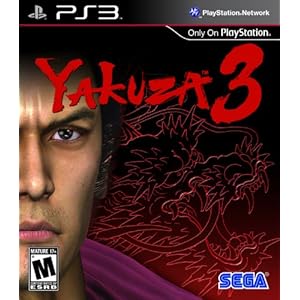
The fourth game just came out in the States a week or two ago, but I'm just now finished with the third, which was released here last year. A year late seems like the right way to play this series - it's too quirky and occasionally clunky for me to justify paying $60 for the experience when it's brand new, but as a budget purchase a bit later, it's definitely worth it to experience the series' oddness and charms again. The jump to current generation hardware doesn't do much to change the general gameplay, though the upgrade in visuals and putting the camera behind Kazuma instead of in static places when exploring is certainly welcome. Like in Yakuza 2, you spend the game bouncing between the franchise's trademark location of Kamurocho and another, in this case a city and nearby beach on an island in Okinawa. The differences between these locations are much greater than the differences between fake Tokyo and fake Osaka in Yakuza 2, not just in the look of the place but what you tend to actually do there, which makes it a more distinct entry in the series with more diversity of tone.
The third game finds Kazuma finally retired from gang life, and running an orphanage by the beach with Haruka. Of course eventually stuff happens that pulls him back into the criminal underworld he's been trying to leave for years, though the story spends a significant amount of time just having you help out and watch over the kids in your care, to a surprising degree for a series best known for having you punch the hell out of a lot of dudes. All of the kids get developed and fleshed out a bit, and the laid back tone the game takes on in these sections was pretty refreshing after something like the desperate suicide mission in Mass Effect 2. The game never totally abandons this either, always giving you little bits of flavor in between all of the violence that gets going as the story kicks into high gear. I didn't think the overall plot was quite as good as earlier games, not having the first's emotional connection between Kazuma and the villain or the second's outright insanity, but it's still a capable, generally entertaining tale of betrayal and corruption with a few moments that stick out. The ending kind of pulls a switcheroo for no reason, and it can get embarrassingly over-the-top here and there, but it's all forgivable.
The gameplay is pretty much exactly what series veterans probably expected, though I was a bit disappointed by how similar it felt to the PS2 games. The combat system in the series has always been fairly fun, but a bit shallow in its execution and frustrating when it tries to actually challenge the player. Kazuma has the same attacks and movements he always did, and they added a number of new features like customizable weapons and some new context-specific moves, but it's still pretty much the same system they've always had, and it's wearing a little thin after a new generation of hardware and three games. It's not annoying enough to truly damage the experience, but it's always a pain when an enemy just seems to block everything you do and you have to find whatever single technique will be effective at all against him. I like how the random fights now transition directly into the combat mode without a loading screen, but I wish they had pushed the whole thing farther than that.
When you're not fighting dudes you're generally running around in whatever city the game wants you to be, looking for the next plot trigger, though this is where a lot of the fun is, because there's always tons of things to do besides find the next cut scene. There are people to help, side quests to do, shops to buy items from, and mini games to play. I think it's stupid that Sega removed some of this extra content from the American release because they thought we wouldn't understand it if it was "too Japanese" or something, because if we're already playing a game with subtitled Japanese dialogue we're probably okay with it. But the truth is, I never really felt that absence because there was always more new stuff to do if I wanted and I hardly scratched the surface.
So the game gives you all this stuff to do, and occasionally something in the story will force you to a new location or change things a bit so you have to fight or sneak through the city before dropping you back into the regular game. It's a simple formula that generally works, though there are occasions when it all feels a bit dated. Plot bits awkwardly transition between text boxes and full voiced dialogue, and the implementation of a bit of action will be sometimes seem poorly though out, things like that. But while it's not the most advanced game there is, its flaws didn't annoy me very much, even if they might have placed a cap on how much I really could have been into the experience. The Yakuza series is in this weird place where it's half big action game and half quirky Japanese oddity, and definitely has a weird charm to it. I wouldn't be surprised to find myself talking about the fourth game a year from now.
AAAAAGGGHHHH
16 years ago


































No comments:
Post a Comment